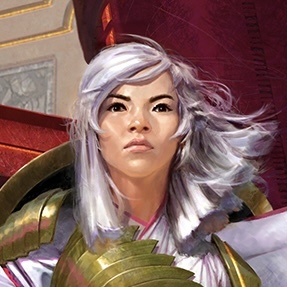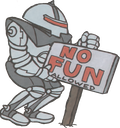Also is that the best softwares to learn for that kind of thing?
You could always join the PSL and learn from them yourself
I tried joining my local chapter and got ghosted after meeting 3/4 to become a candidate member (this is before the 17 week course). I think I gave off too many pro-anarchy vibes lol.
yeah, I mean if you’re ideologically opposed, then of course they aren’t going to let you join lol
I’m not a design person but I hear that Krita is superior free open-source alternative to Gimp.
Idk more than that honestly. I’d just recommend that before you build your skill tree out in one particular design/editing oriented program and you end up getting locked into one tool, make sure that you are very cognisant of what you’re locking yourself into first.
Reskilling into a different tool isn’t impossible but it can be prohibitively difficult due to a sort of sunk-cost fallacy with regards to time invested; why are you going to drop a solid 10-50 hours into learning a new tool when you can spend 20 minutes with your “native” tool to achieve the same outcome, especially when we’re talking about a hobby endeavour and not a professional one?
Are there specific pieces that you want to be able to re-create? I can give more specific advice if you have one you want to point to.
For vector stuff (crisp lines, shape stuff), use Inkscape. The tools to start with are the selector tool (move shapes), node tool (edit shapes), and pen tool (the most powerful shape too, it’ll take a while to learn this one). The dialogs to start with are “fill and stroke” (control-shift-f) and “align and distribute” (control-shift-a). The best way to learn these is to piddle around with them for a while, then go read the docs on these tools, then go piddle around some more.
For photo manipulation (editing or combining existing photos), use Gimp. The things to start with are layers, copy/paste, unified transform, “add layer mask” (in the layer menu), the brush tool (for editing layer masks, actually drawing in Gimp is not a good use of the program (also this is what you should use whenever you think you want the lasso tool)), and colors->curves. This is a pretty advanced way to use the tool and overkill for a lot of things, but it’ll also work on the vast majority of photo manipulation jobs you might want to do. The best way to learn these is the same - piddle around, read the docs on the tools, piddle around some more - except it’ll take more loops back and forth to the docs.
For painting, use Krita. I don’t have anything useful to say about how to learn to use this one.
If you want a simpler option that is free and more accessible, I like canva.com for posters and such
what do you mean? we use canva for our intsagram.
Adobe is unfortunately the best. Whether Photoshop, illustrator, or Indesign. All have their purpose. Tons of youtube videos on the basics too. Their UI is generally the easiest to use and most straight forward Imo. If your computer can still run Creative Suite 6, it can be found quite easily 🏴☠️ and is very similar to the newer versions. The newer versions are more annoying to crack if you go that route, but it’s still doable.
However, the best non Adobe software I’ve used is the Affinity suite. It’s still paid, but they have generous trials without credit card, it goes on sale quite a bit, and I think you can buy it outright for a lot less than Adobe charged when they did that. It has alternatives for all three I mentioned above.
I’m sure the typical free and open source projects people mention work fine, but I never clicked with any of it. GIMP is terrible though.
In any case, just learn the ui and basics by trying to make stuff–or even try to copy someone else’s design so you have a goal and can try to figure out how to do it. Like anything, just practice.
Even though the software differs, the concepts generally remain the same so you still do get transferable skills if you switch. You just have to relearn the UI and shortcuts etc…
Agitprop is a very broad term. What are you meaning exactly? What is the target media? Screen, print, posters, publications, clothes, billboards, TV,… Different tools.
Do you have ideas about what and how you want to communicate and how but lacking the technical skills? This is more important and harder to learn. Simple free tools can be used to excellent effect without much tech skill.
I learned on adobe a long time ago and it was great. Honestly gimp is OK for some basic stuff but I wouldn’t want to be doing anything serious in it. Inkscape continues to suck ass; been hoping it would improve since the killustrator days but am not optimistic.
But gimp/Photoshop/krita illustrator/inkscape InDesign/scribus/libreoffice… These are 3 different kinds of tools for 3 different purposes. So you need to think about your goals first.
Shorter answer: The way you learn is to spend hundreds of hours fucking around. Think of something to do, can be anything random, start with whatever program you feel like and try to do it. Then go on the internet to solve problems you have. Peruse the software documentation and tutorials to get a feel for what kind of task your software excels in and switch if needed. Learn about layers at the very first opportunity.
I rec the site alternativeto.com to find software. Type what you know (e.g. Photoshop) into the search and then use the filters.
You’d want an Adobe InDesign-type tool, which Inkscape can act as. GIMP not so much. However the learning curve starting from no experience would be pretty high. I’d recommend playing around in Canva first, it’s much more accessible and gives lots of building blocks.
Why not join PSL?
Practice, practice, practice. Try re-creating designs you like to learn, then go make your own once you’re confident.
Doubt it matters that much what software you use to do some basic things - you could even use something like LibreOffice Writer if you really wanted to. I’d imagine learning some of the theory behind making eye-catching, readable works that effectively communicate something matters much more. Of course there’s a lot more artistic things you can do to improve things.
Like ReadFanon said, I’ve heard good things about Krita from artsy people if you want something free. Clip Studio Paint seems like a pretty standard recommendation for paid software for individuals. PS seems to only be something people use because they learned to use it like a decade ago, so its easier to keep using it than to learn new software. GIMP seems pretty universally disliked (granted, its what I learned to use for some very basic things over a decade ago and I rarely use art programs, so its good enough on the rare occasions I’m trying to do something that requires one). Not sure about specifically for agitprop though.
I don’t do design or art though, so probably better to learn from other people. Some artists love explaining their processes while they work, so just chillin’ with them can be a way to get some basic understanding how workflows and how to use software, but so many artists have their own way of doing things, so I’d say just try things and see what does and what doesn’t work and don’t expect things to work well on your first try.
Learn the keyboard shortcuts










